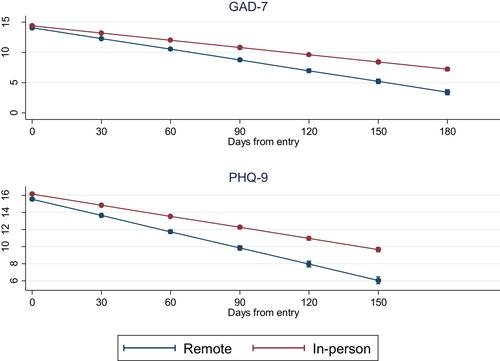COVID-19 had an immediate impact on the way Improving Access to Psychological Therapy (IAPT) services in the United Kingdom were delivered, requiring services to move to remote therapy. While remote therapy has been shown to be effective, little is known about the effects associated with moving to remote therapy delivered during COVID-19 within IAPT services.
The objective of the study was to assess the characteristics of those undergoing remote therapy and test the effects associated with the effect of remote delivery on anxiety and depression symptoms compared with in-person therapy before lockdown.
We conducted a retrospective, cross-sectional benchmark comparison of remote therapy across four IAPT services in Greater Manchester. Routinely collected measures of anxiety (GAD-7) and depression (PHQ-9) were used to compare effects across the two time periods. A mixed-effects model was conducted to assess within and between group changes in anxiety and depression, while controlling for pre-specified confounders.
Remote therapy did not appear to impact on service provision, with the number of sessions offered and attended being similar to those prior to COVID-19. Both face-to-face (pre-COVID-19) and remote therapy (during COVID-19) were associated with variable improvements in anxiety and depression with no significant difference between them. However, remote therapy was associated with a more rapid decrease in symptoms in comparison with face-to-face treatment. Mean improvement in symptoms was small and increased as number of sessions/time increased and analysis of rates of improvement indicated that both face-to-face and remote therapy might need more time to reach target cut-off points on measures.
Both face-to-face and remote therapies delivered under IAPT were associated with improvements in symptoms with no apparent difference apart from the finding that remote therapy was associated with more rapid change.
Remote therapy delivery in IAPT does not appear to confer a disadvantage over face-to-face contact, but at a group mean level the magnitude of improvement associated with both treatments was small. Remote therapy provision may widen patient access to and engagement with psychological services.


